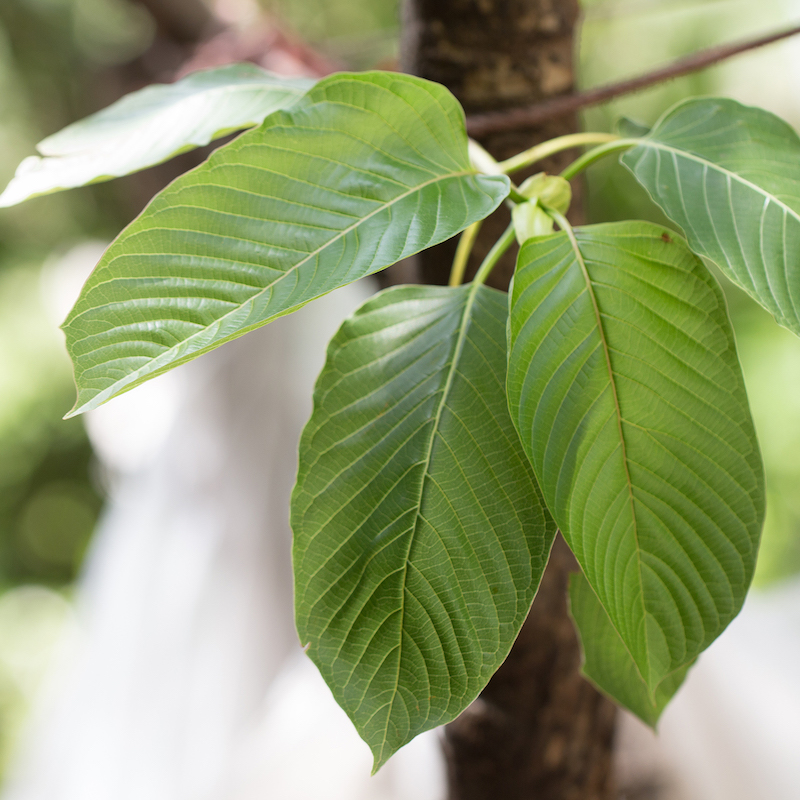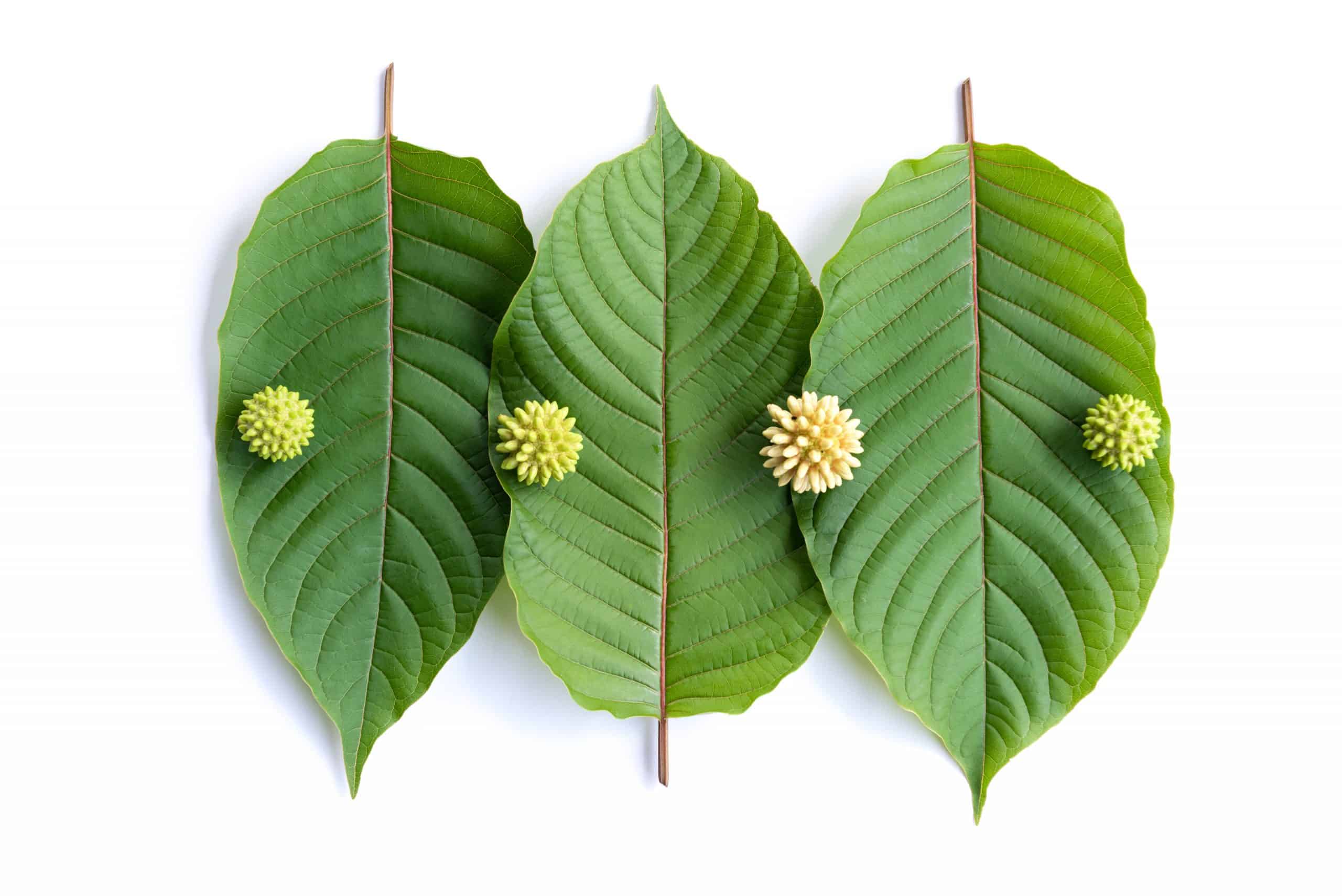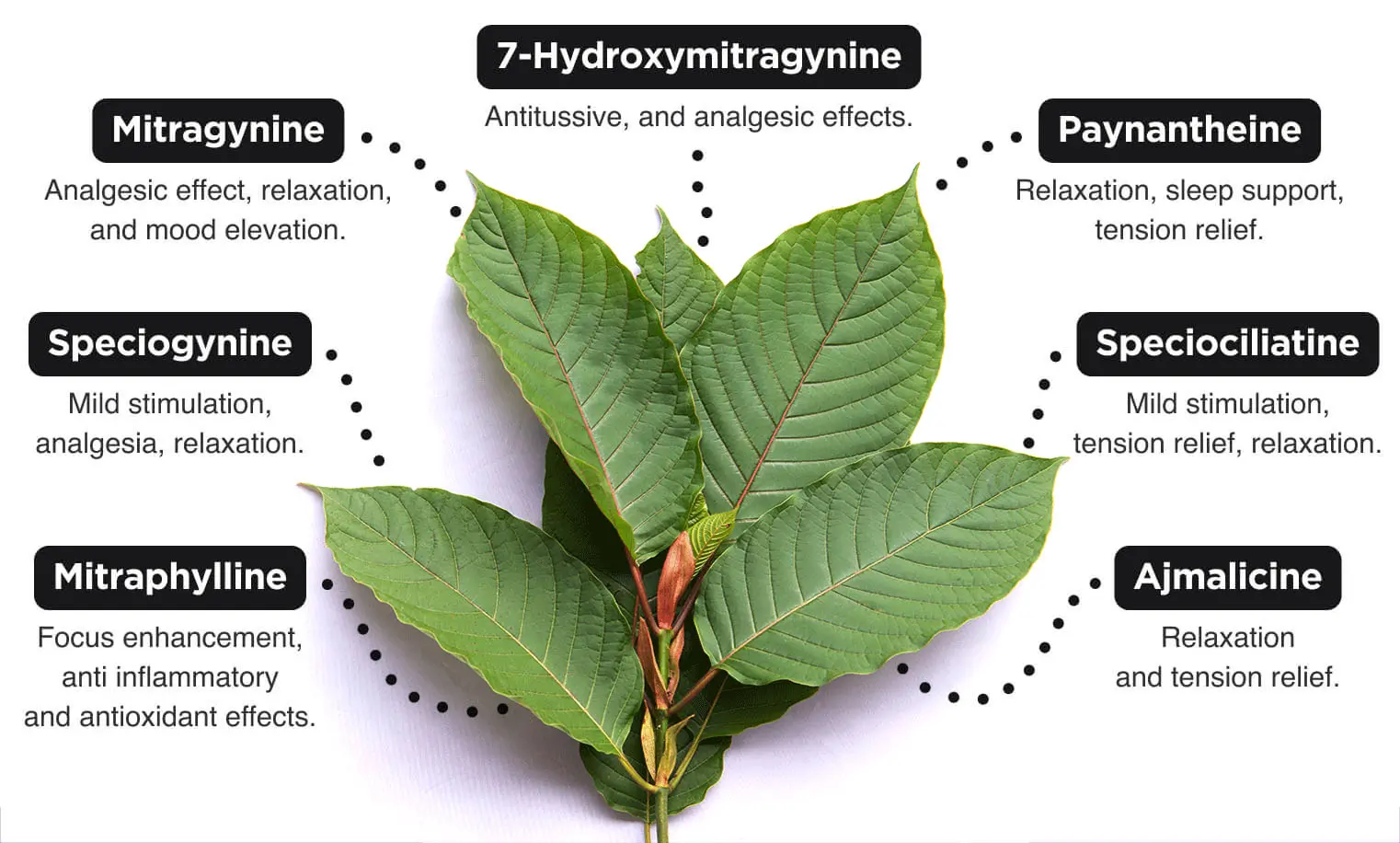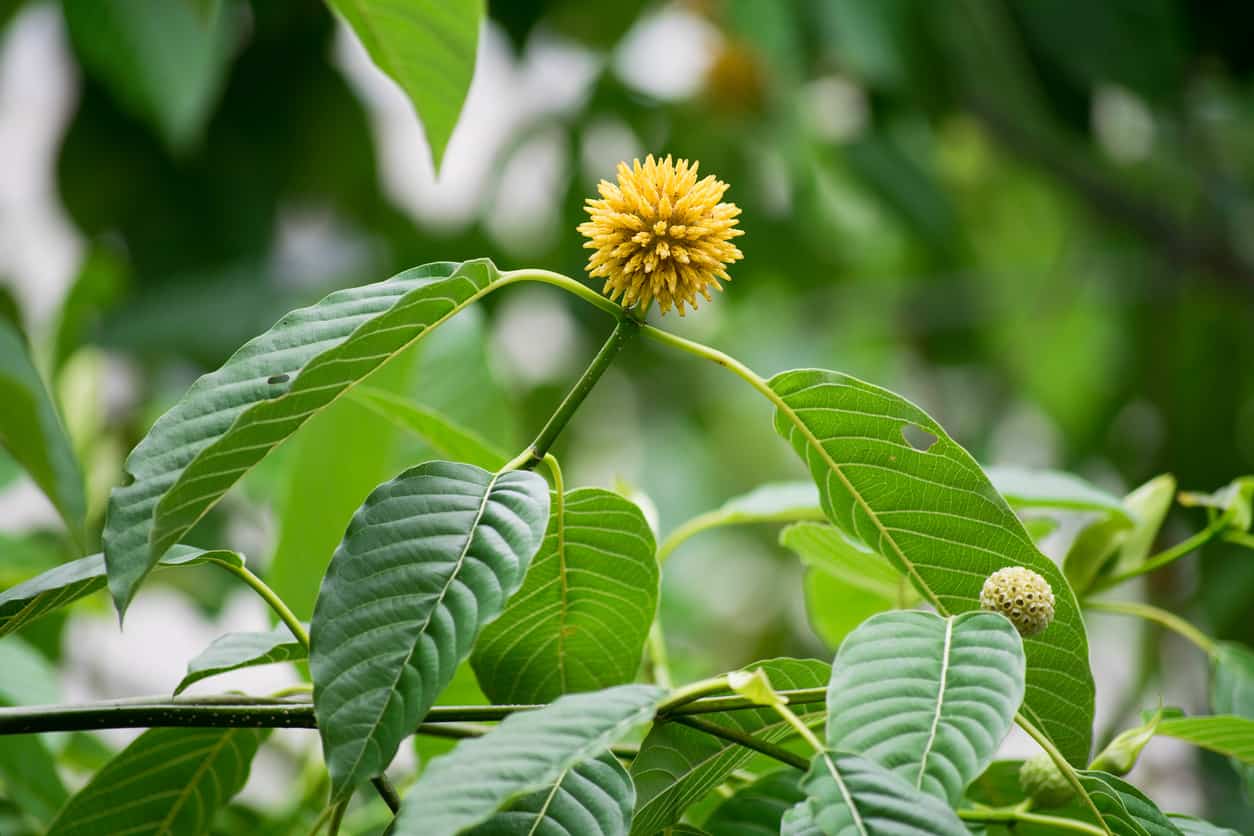Meet KRATOM!
The true magic herb
Also known as mitragyna speciosa, kratom is a tropical tree native to Southeast Asia. The leaves of the kratom tree are typically consumed in the form of tea, capsules, or powder, and are known for medicinal purposes, such as pain relief, anxiety reduction, and to boost energy and mood.
Kratom leaf medicinal purposes are based on naturally occurring compounds known as alkaloids (mitragynine and 7-hydroxymitragynine), which are known to produce pain-relieving and anti-anxiety effects.
Kratom leaves have been used in traditional medicine for centuries, but in recent years, it has gained popularity in the United States as a natural supplement for pain management, stress relief, and opioid withdrawal support.
In terms of consumer’s product, it is important to note that, despite its centuries of usage, kratom is not regulated by the FDA and its safety and effectiveness have not been extensively studied scientifically.


Given its strength, for some people kratom may have undesirable side effects, such as nausea, constipation, and addiction. In extremely rare cases – mostly related to excessive consumption – kratom products have been associated with liver damage, seizures, and death. If you are considering using kratom and are concerned about some of its potential side effects, it is recommended you consult your doctor.
Kratom leaf contains naturally occurring compounds known as alkaloids (the mitragynine and 7-hydroxymitragynine), which are well-known to produce pain-relieving and anti-anxiety effects. Kratom leaves have been actively present in traditional medicines for centuries, and it is now making its way to the United States and western countries. While kratom is not deemed illegal in many countries, including the United States, it may appear listed as a controlled substance in some parts of the world until further tests can be performed.
The use of kratom has recently come under some scrutiny due to reports of adverse events. It’s important to note that, like any substance, kratom can have potential side effects and interactions with other medications or substances. However, because the withdrawal effects of kratom are often reported to be less severe than those associated with traditional opioids, some people use kratom to manage opioid use withdrawal.
THE KRATOM ALKALOIDS FAMILY
AND THE INCREDIBLE BENEFITS THEY CAN BRING TO YOUR LIFE

Kratom has been used for hundreds of years in Southeast Asia as a natural home remedy!

Why Is It Important To Only Buy Kratom Products From Reputable Sources?
The vast majority of issues related to Kratom usage have been traced back and associated either with overdoses or inappropriate formulations of kratom-related compounds. Some businesses sell kratom powder with very little to no warnings or preparation guidance, pushing the responsibility of formulating the drinks to consumers, which is where most reported problems arise.
Team Ultimate has developed four distinct brands, each with a different strength, format, and price point to ensure the proper and safe formulation is aligned with guidance of usage, creating options for everyone. Our Made in the USA kratom drinks and pills are produced in FDA Certified Facility specialized in high-grade consumer products, and our proprietary kratom products set us apart from the competition, delivering superior effects and a more authentic AND safer kratom experience.
In terms of safety, it’s important to note that kratom can be habit-forming for certain people, and it’s best to use it sparingly and only as needed. It’s also a good idea to consult with a healthcare professional before starting to use kratom, especially if you have any pre-existing medical conditions or are taking any medications.


Pros and Cons of Kratom
While there are no official studies to back up any of the claims below, user experience and certain independent research have supplied significant information and yielded similar outcomes, which are now the basis for most kratom users’ beliefs.
Who is Kratom for?
The ideal users of kratom vary depending on the reason for its use. Some common groups of individuals who use kratom include:
People looking for pain relief:
Kratom has pain-relieving properties, so it’s used by individuals looking for a natural way to relieve their pain.
Individuals with anxiety or depression:
Kratom has been shown to have anxiolytic and antidepressant properties, so it’s sometimes used as a natural remedy for these conditions.
Athletes and fitness enthusiasts:
Kratom has been reported to have energy-boosting capabilities, which makes it a popular supplement for athletes and fitness enthusiasts.
Individuals looking for an alternative to opioids:
Kratom has the potential to provide pain relief without the risk of addiction that opioids pose, so it’s often used by individuals seeking a more natural alternative to pain medication.
Important:
Kratom does not have FDA approval to treat any condition, so there is no specific recommended dose. Early studies suggest that doses below 5 grams of raw plant material may act as a stimulant, similar to caffeine. Higher doses between about 5 and 15 grams may have the opposite effect and may help relieve pain.
Who Should Avoid it?
There are conditions in which people should avoid most medications and products, including kratom. These include:
Pregnancy: Kratom has not been studied enough to determine its safety during pregnancy, so it’s best to avoid it
Liver or kidney disease: Kratom has been shown to have some negative impacts on the liver and kidneys, particularly when used for long periods of time or in high doses. If you have pre-existing liver or kidney disease, it’s best to avoid kratom use.
Mental health conditions: Kratom use can increase anxiety, depression and exacerbate certain mental health conditions. If you have a history of mental health issues, it’s best to discuss kratom use with your healthcare provider before taking it.
Medication interactions: Kratom can interact negatively with certain medications, including antidepressants, sedatives, and painkillers. If you are taking any medications, you should talk to your healthcare provider before starting kratom use.
History of addiction: Kratom has the potential for addiction and abuse if used improperly. If you have a history of addiction to other substances, it’s best to avoid kratom use or discuss it with your healthcare provider before taking it
Frequently Asked Questions About Kratom
Beyond misinformation and fearmongering. Just honesty and factual responses!
What is Kratom?
Kratom (Mitragyna speciosa) is a tropical tree native to Southeast Asia. Its leaves have been used traditionally for pain relief, energy boosting, and mood improvement. However, due to its recent surge in popularity and potential risks, many questions surround kratom. Here are ten of the most common questions and detailed answers to help you make informed decisions.
Is kratom safe to use?
The safety profile of kratom is still under investigation but most users report minimal to no side effects. But, as any new substances, there are potential risks to consider. Kratom can interact with medications, and high doses may lead to addiction, dependence, and withdrawal symptoms. Additionally, kratom can cause nausea, vomiting, constipation, and drowsiness. It’s crucial to consult with a healthcare professional before using kratom, especially if you have underlying health conditions or take medications.
What are the legal considerations of kratom use?
The legal status of kratom varies by country and even within some states in the US. While kratom is currently unregulated at the federal level in the US, some states have banned or restricted its use. It’s crucial to check your local laws before using kratom to avoid legal trouble.
Can kratom be dangerous for people with certain health conditions? pen_spark
Kratom use may be particularly risky for individuals with specific health conditions. This includes people with liver or kidney problems, pregnant or breastfeeding women, and those with a history of mental health issues. It’s best to consult with a healthcare professional before using kratom if you have any pre-existing health conditions.
How is kratom typically consumed?
There are numerous methods to consume kratom. Traditionally, the leaves were chewed or brewed into tea. Powdered kratom is also widely used, often blended into capsules, drinks, or food. Furthermore, kratom extracts are accessible, but their potency varies greatly, raising the danger of side effects. Our sponsor, SlokKratom (www.slokkratom.com), is one of the largest and most reputable Kratom Tincture manufacturers in the United States. They value their goods’ production in an FDA-certified facility, as well as their kratom source, which is one of the most pure and secure in the world. Their Tinctures are highly regarded by their loyal customers, with the added bonus that the dosage is precisely calibrated to be below the risk threshold while retaining all of the benefits of Kratom for individuals who require it on a daily basis or use it recreationally.
What are the reported effects of kratom?
Kratom’s effects vary depending on the dose and individual factors. At low doses (1-2 grams), users report feeling energized, more focused, and experiencing improved mood. Some claim it alleviates mild pain and anxiety. At higher doses (5+ grams), kratom’s effects become more sedative, potentially reducing pain and inducing a relaxed state. However, these higher doses may also lead to nausea, dizziness, and constipation.
Is kratom addictive?
Kratom possesses some addictive properties, particularly at high doses. Regular use may lead to dependence, where users feel they need to take kratom to function normally. Stopping abruptly can trigger withdrawal symptoms like muscle aches, insomnia, anxiety, and restlessness. The risk of addiction seems to increase with higher doses and more frequent use.
Can kratom be used to treat opioid withdrawal?
Some people utilize kratom to manage opioid withdrawal symptoms. While kratom may offer some relief, it’s not a medically approved treatment. Kratom can interact with medications used for withdrawal, potentially worsening symptoms. It’s vital to seek medical advice before using kratom for opioid withdrawal.
What are the potential risks of using kratom with other medications?
This response is applicable to any substance, not only kratom. However, due to its potent qualities, kratom can interact more strongly with a variety of drugs, including several blood thinners, antidepressants, and treatments that impact the central nervous system. These interactions can be serious, so before using kratom, make sure to tell your doctor about all medications you are currently on.
What are the long-term effects of kratom use?
The long-term effects of kratom use are not fully understood. Ongoing research is needed to determine the potential impact on brain function, organ health, and overall well-being. Due to the lack of long-term studies, exercising caution is advised, especially regarding prolonged use.
Articles About Kratom
1-Ingredient Peach Kratom Iced Tea – Top Tree Herbs
Time to adultify a childhood favorite with a creamsicle smoothie that supports focus and motivation. Tea for dessert has never tasted so good.
The post 1-Ingredient Peach Kratom Iced Tea appeared first on Top Tree Herbs.
Iced Matcha Kratom Latte Recipe for Calm Energy – Top Tree Herbs
Time to adultify a childhood favorite with a creamsicle smoothie that supports focus and motivation. Tea for dessert has never tasted so good.
The post Lemon Kava Tonic Recipe appeared first on Top Tree Herbs.
Iced Matcha Kratom Latte Recipe for Calm Energy – Top Tree Herbs
Time to adultify a childhood favorite with a creamsicle smoothie that supports focus and motivation. Tea for dessert has never tasted so good.
The post 1-Ingredient Peach Kratom Iced Tea appeared first on Top Tree Herbs.





